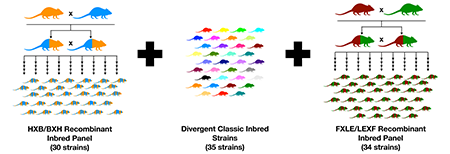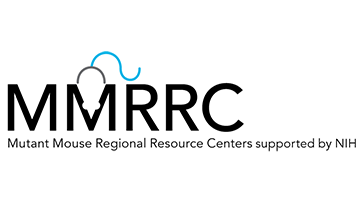Grant Number: U42OD012210
Research Emphasis/Objectives
The Mutant Mouse Resource & Research Center (MMRRC) at the University of California, Davis (UC Davis), was established in 1997 and is one of the founding institutions of the MMRRC national program.
With a growing archive of more than 50,000 mutant alleles, the MMRRC at UC Davis imports, archives, maintains, and distributes live mice, frozen germplasm, stem cells, and molecular vectors for use in biomedical research. The MMRRC accepts transgenics, knockouts, genome-edited, spontaneous, and other types kinds of mutant mouse lines at no cost to the donor. After quality control checks, rederivation, and cryopreservation, the MMRRC distributes pathogen-free breeding stock, germplasm, cells, and/or tissues to requesting investigators for a small fee. The MMRRC operates within the UC Davis Mouse Biology Program (MBP), a center of scientific excellence in mouse biology, genetic manipulation, and comprehensive phenotyping of mouse models of human disease.
Services Provided
Specialized Services: Fee-For-Service
The MMRRC at UC Davis provides a wide array of specialized services on a recharge basis. These services include custom model generation (e.g., homologous recombination in embyonic stem [ES] cells, Cre/LoxP, CRISPR/Cas9, etc.), assistive reproductive technologies (IVF, intracytoplasmic sperm injection [ICSI]), genotyping and genetic analysis, behavioral testing, gamete and embryo cryopreservation, construct design, gnotobiotics, phenotyping and analytics, imaging, advanced surgical models, and vivarium and colony management.
Animals
The MMRRC at UC Davis is committed to upholding the highest standards of experimental design and quality control that optimize reproducibility and rigor through the distribution of well-characterized inbred, hybrid, and mutant mice. This commitment involves the rederivation of mice from well-annotated and documented backgrounds to a pathogen-free status, allowing investigators to generate robust and reliable results.
Bioinformatics
The MMRRC at UC Davis offers investigators such informatics services as data collection, hosting, visualization, analysis, dynamic web presentation, and publication quality reporting.
Biological Materials
The MMRRC at UC Davis provides cryopreserved germplasm, genomic DNA, and tissue samples from mutant models.
Colony Management and Breeding Services
The MMRRC at UC Davis offers Speed Cohort Delivery (SCD) for rapidly generating and expanding mutant cohorts, transferring genetic mutations onto different genetic backgrounds, and managing breeding colonies of mice.
Cryopreservation and Cryostorage
A cryopreserved archive (embryos, sperm, and/or ES cells) is created and maintained for all mouse lines deposited into the MMRRC at UC Davis. The MMRRC provides cryopreservation services to investigators as protection against loss of valuable research models due to disease breakouts, genetic drift, or breeding interruptions.
Cryo-Resuscitation and Rederivation
The MMRRC at UC Davis provides cryorecovery services to re-establish live mouse colonies from archived germplasm, including the use of IVF or ICSI and embryo transfer and Caesarian section. Investigators receive recovered litters with confirmed genetics, pathogen-free health status, and microbiome analysis.
Genetic Testing
The MMRRC at UC Davis offers a wide array of genetic testing services for mice, germplasm and cells, including endpoint generic and gene-specific genotyping, genetic fingerprinting and single nucleotide polymorphism (SNP) analysis, genomic integration analysis by target locus amplification, whole-exome and whole-genome sequencing, and more.
Genetic Engineering: ES Cell and Microinjection Services
The MBP utilizes a variety of different techniques, including genome editing (CRISPR/Cas9), transgenic insertion, and homologous recombination in ES cells, to generate constitutive, conditional, and inducible knockouts and knockins. We also offer Fast-Trak Genome Editing, which is on-demand de novo generation of specific alleles (indels to targeted insertions, patient variants, etc.) in mice using CRISPR/Cas9 genome editing. When requesting this service, researchers will be given prioritized attention at subsidized cost if they commit to depositing their newly generated mice into the MMRRC.
Imaging Services
The MMRRC at UC Davis offers non-invasive in vivo imaging and image analysis, including optical projection tomography (OPT), computerized tomography (CT), nuclear magnetic resonance (NMR), and PET/MRI, which allows for longitudinal in vivo imaging.
Gnotobiotic Research Services
The MMRRC at UC Davis offers exploration of the pathobiological integration of the microbiome in health and disease in a germ-free environment through its gnotobiotic mouse resource center (GMRC). Services include targeted microbiome characterization and analysis, consultation on the impact of differing microbiota on biology and disease in mice, studies assessing microbiome on model phenotypes, and the manipulation of microbiomes through rederivation and fecal transplants.
Phenotyping and Analytics
The MMRRC at UC Davis offers a full suite of observational and procedural testing platforms, including morphology, ataxia, gait, behavior, cardiology, brain response, body composition, exercise, and after-life services that include necropsy, gross anatomic pathology, tissue collection and processing, histopathology, and special staining.
Teaching Resources and Training
The MMRRC at UC Davis, in collaboration with the UC Davis Mouse Biology Program, offers training opportunities for undergraduates, graduate students, veterinary and medical students, and post-D.V.M. trainees.
Contact Information
Mutant Mouse Resource & Research Center
c/o Mouse Biology Program
University of California, Davis
2795 Second Street, Suite 400
Davis, CA 95618
mmrrc.ucdavis.edu
Principal Investigator
K. C. Kent Lloyd, D.V.M., Ph.D
Phone: 530-754-MMRRC (6677)
Fax: 530-757-3277
mmrrc@ucdavis.edu
Other/Resource Contacts
Renee Araiza
MMRRC Repository Manager
Phone: 530-757-3273
Fax: 530-757-3284
rsaraiza@ucdavis.edu
Customer Service
MMRRC at UC Davis
Phone: 530-754-MMRRC (6677) or 530-757-8476
Fax: 530-757-3284
mmrrc@ucdavis.edu





